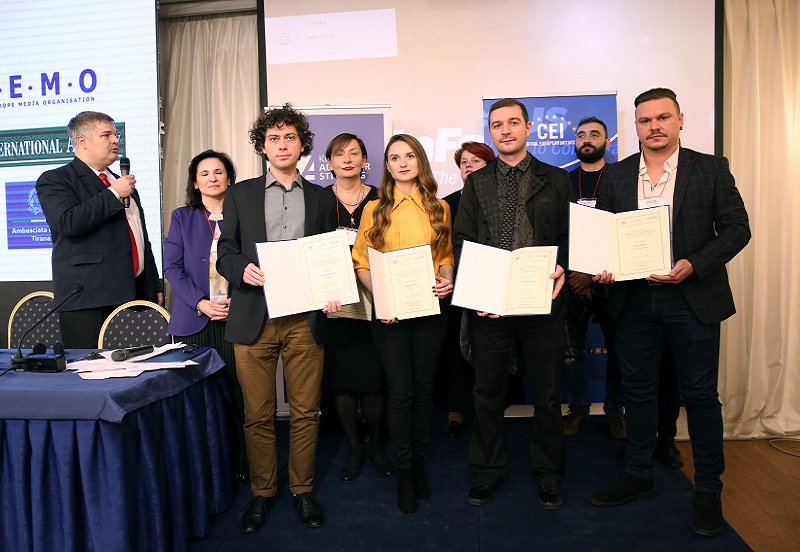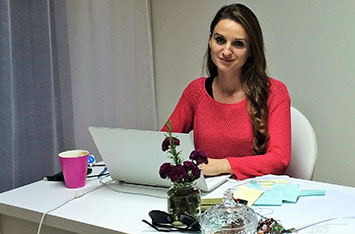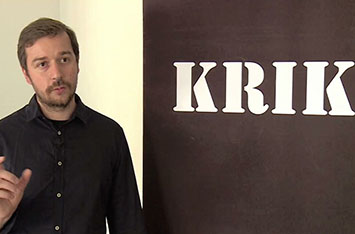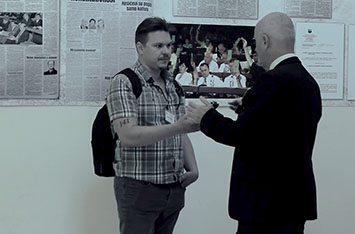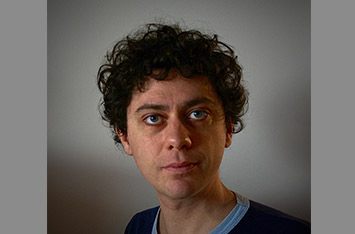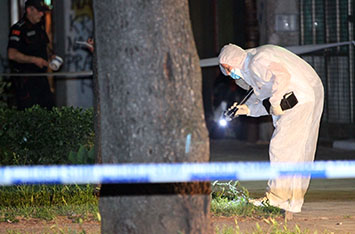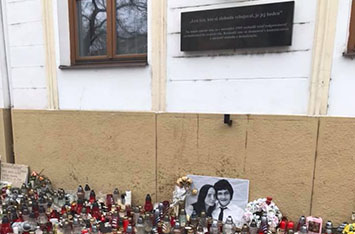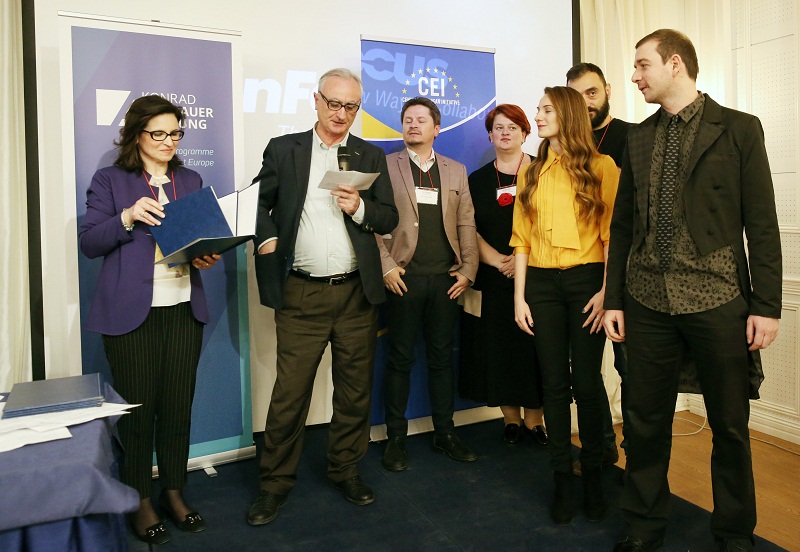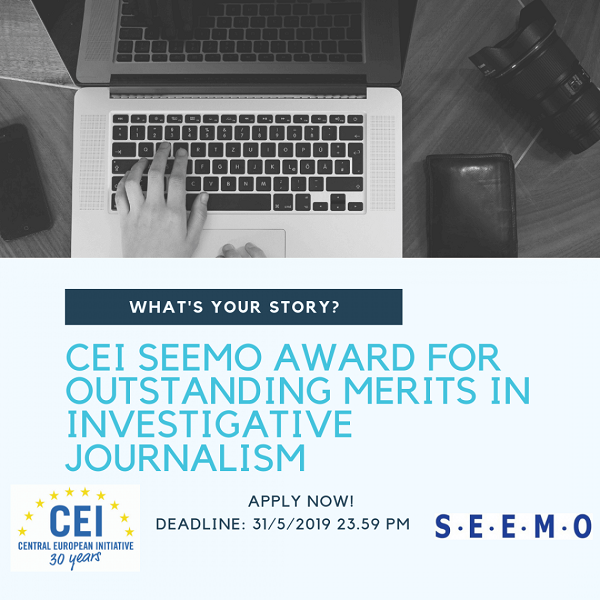
CEI SEEMO Award for Outstanding Merits in Investigative Journalism
CALL FOR APPLICATIONS 2019
Trieste, 3 April 2019
The Central European Initiative (CEI) and the South East Europe Media Organisation (SEEMO) have opened the Call for Applications 2019 of the CEI SEEMO Award for Outstanding Merits in Investigative Journalism. The Award is meant to honour the work carried out by investigative journalists and their contribution to investigative reporting despite the difficult conditions under which they often have to operate.
The Award is divided into two categories:
- 1 PROFESSIONAL JOURNALISTS – 4,000 EUR
- 2 YOUNG PROFESSIONAL JOURNALISTS (born on or after 1/1/1989) – 1,000 EUR
This year the Award has a special focus on environmental issues.
Applications will be examined by an international jury composed of distinguished journalists and media experts from the region, which may also include winners of previous editions of the Award. The jury will meet In Trieste in July 2019 while the awarding ceremony will take place during the South East Europe Media Forum (SEEMF) in Zagreb, Croatia, on 4-5 November 2019.
DEADLINE
Applications shall be submitted by Friday, 31 May 2019 (23:59 CEST).
ADMISSION CRITERIA
Eligibility
The Call is open to nationals of the 17 CEI Member States: Albania, Belarus, Bosnia and Herzegovina, Bulgaria, Croatia, the Czech Republic, Hungary, Italy, Moldova, Montenegro, North Macedonia, Poland, Romania, Serbia, Slovakia, Slovenia and Ukraine.
Category 1: candidates who have been actively involved in investigative reporting over the last two years and are still active in journalism. Two samples of journalistic work will be relevant for the evaluation from the jury.
Category 2: candidates who have been actively involved in investigative reporting, even in the context of training activities organised by schools/universities/NGOs and, as a result, should have published at least one investigative story meeting all professional standards. One sample of journalistic work will be relevant for the evaluation from the jury.
Print, Radio, TV, news agencies and Internet media are admitted.
Candidates who have been actively engaged in reporting on environmental issues are particularly invited to apply.
HOW TO APPLY
Candidates shall fill in the Online Application Form available here: www.cei.int/contact/application_cei_seemo
The following documents in PDF format shall be uploaded:
- 1. a detailed Curriculum Vitae;
- 2. a recommendation letter written and signed by trustworthy individuals, journalism and media organisations, media companies, civil society organisations, journalism schools or universities, trade unions or other social organisations from the target countries;
- 3. up to three samples of journalistic work in a single PDF document (minimum two samples in Category 1, one sample in Category 2). For online work samples, insert hyperlinks in a PDF document, or print out online articles in a PDF file. Hyperlinks need to be accessible at least until 31 July 2019. In case of audio/video material, please upload the files making use of file-sharing services (e.g. WeTransfer or Dropbox) including a script or scenario. Material prepared in local languages should be accompanied by a short summary in English.
Applications that do not include all requested documentation will not be considered.
SELECTION CRITERIA
The jury will take into account the relevance of the matters covered by the reports which should have a focus on the target countries as well as the quality of reporting in terms of documentation, data, writing and production. The personal risks taken while performing the duties as well as the impact on society of the messages conveyed will also be evaluated. Special attention will be given to reports having a focus on environmental issues.
For further information: press@cei.int
ORGANISING INSTITUTIONS
Central European Initiative (CEI) – www.cei.int
The Central European Initiative (CEI) is a regional intergovernmental forum committed to supporting European integration and sustainable development through cooperation between and among its Member States and with the European Union, international and regional organisations as well as with other public or private institutions and non-governmental organisations. While acting as a platform for political dialogue, the CEI has developed a strong operational, result-oriented approach to regional cooperation. It combines multilateral diplomacy and fund, programme and project management as both donor and recipient. The CEI, whose Headquarters are located in Trieste, is composed of 17 Member States: 9 EU members (Bulgaria, Croatia, Czech Republic, Hungary, Italy, Poland, Romania, Slovakia, Slovenia) and 8 non-EU members (Albania, Belarus, Bosnia and Herzegovina, North Macedonia, Moldova, Montenegro, Serbia, Ukraine).
South East Europe Media Organisation (SEEMO) – www.seemo.org
The South East Europe Media Organisation (SEEMO) is a regional non-governmental, non-profit network of editors, media executives and leading journalists from newspapers, magazines, radio and TV stations, news agencies and news media in South East and Central Europe with more than 2600 individual members. With its committees, the SEEMO aims to create a bridge between international media activities and the media developments in the region. One of SEEMO’s main activities is protecting press freedom by helping journalists and media outlets in South East and Central Europe. Over 60 percent of SEEMO’s press releases and letters of protest to governmental and other officials have had positive results. The SEEMO works in cooperation with the International Institute – International Media Center (II-IMC) and the South East and Central Europe PR Organisation (SECEPRO).


